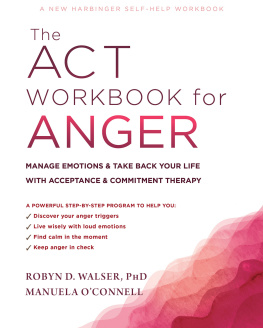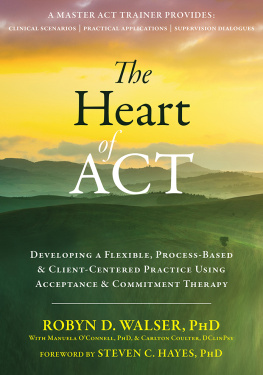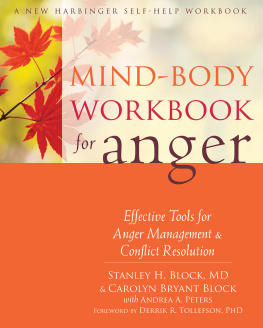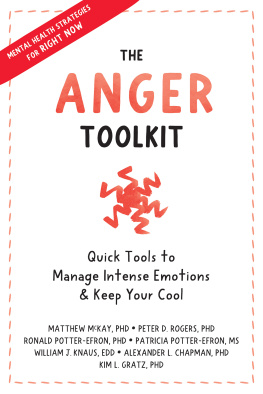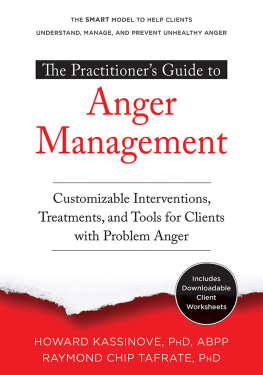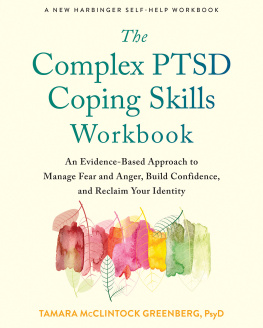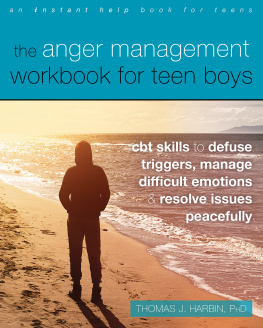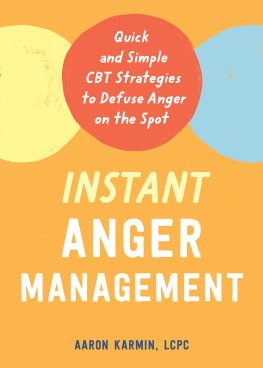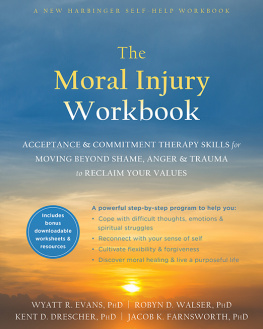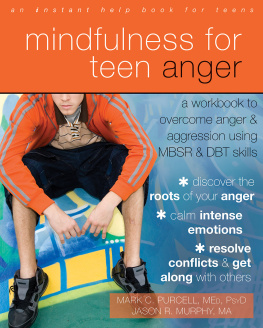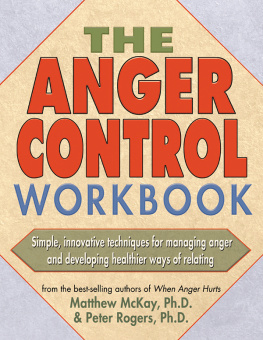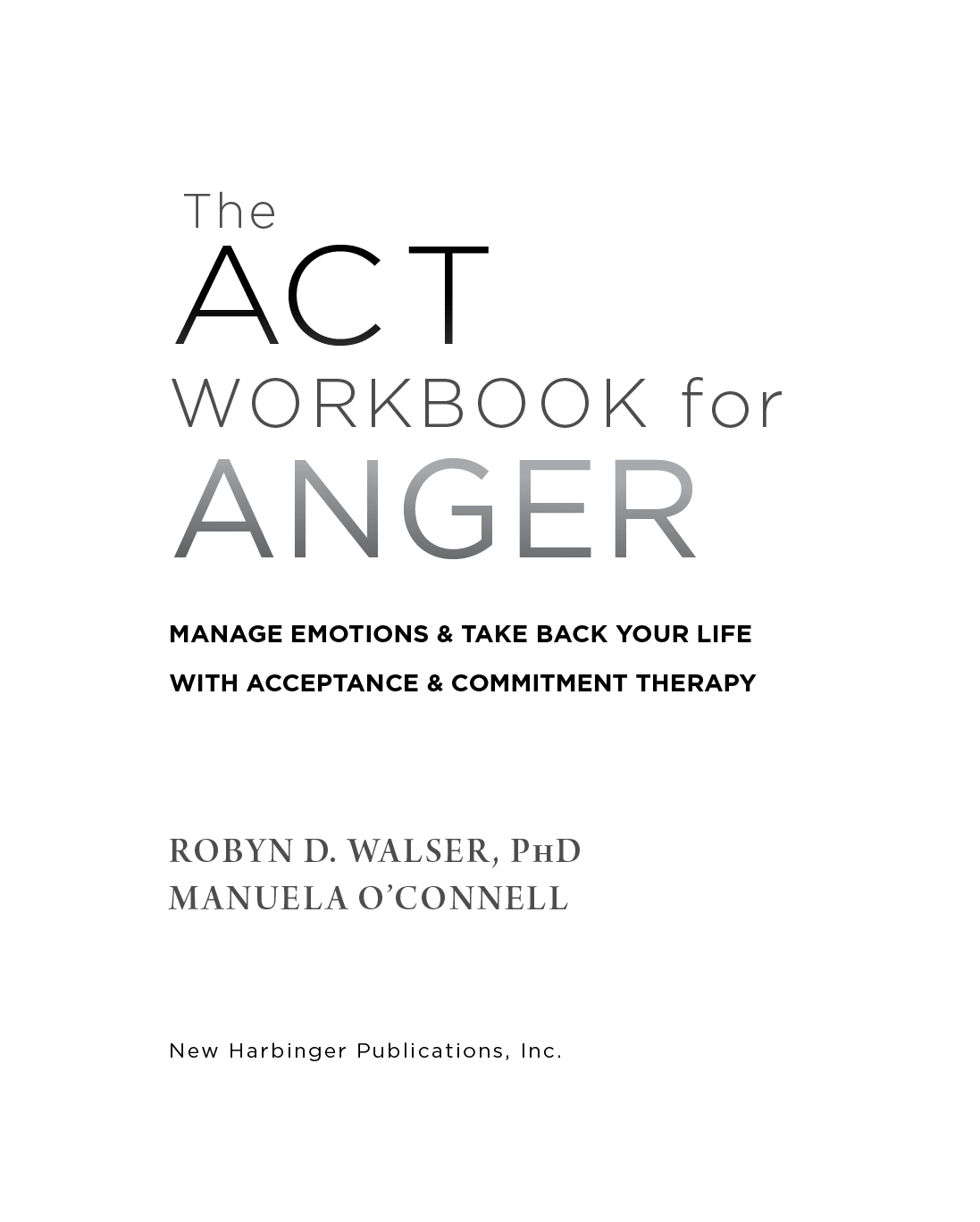Written by two master clinicians with decades of experience, this is a compassionate, science-based approach to responding effectively to anger. Many of the strategies we use to try to control or avoid anger end up backfiring, further increasing pain and shame. Instead, this workbook offers practical tools that will help you understand anger and develop the skills needed to live in line with your values, even when anger is present.
Jenna LeJeune, PhD , licensed clinical psychologist; president of Portland Psychotherapy Clinic, Research, and Training Center; peer-reviewed acceptance and commitment therapy (ACT) trainer; and coauthor of Values in Therapy
This is not yet another hokey book on how to get rid of anger. Instead, we learn that anger is something we all experience. It is part of being human, not something to be ashamed of. Armed with this pivotal insightand armed with their own personal histories of growing up around angerthe authors do a masterful job of taking us on a scientifically based, step-by-step exploration of the inner workings of our anger, and how we can both welcome it and manage it to our lasting benefit. If you have ever felt your anger is over the top, or felt helpless to do anything about it, this is the book for you. Highly recommended.
Kirk Strosahl, PhD , cofounder of ACT, and coauthor of The Mindfulness and Acceptance Workbook for Depression
Two of our most tender voices in ACT, Robyn and Manuela, have created a guide to show us the way from anger is bad to anger is interesting. Brief, and packed with powerful exercises, this book is a must for both suppressors and those who act out. Read it and learn to be sweet to yourself (and your vulnerability) as you do what matters.
Patricia Robinson, PhD , director of training at Mountainview Consulting, director of innovation at Interprofessional Primary Care Institute of Oregon, and coauthor of The Mindfulness and Acceptance Workbook for Depression and The Depression Toolkit
In this clear, engaging, and deeply useful book, Walser and OConnell have created a truly unique offering. The ACT Workbook for Anger masterfully guides us to a compassionate understanding of why we struggle with anger, and offers powerful tools to help those who struggle with this challenging emotionnot by trying to control our anger or shaming ourselves for having it, but by deeply engaging with what is most important to us. A vital resource for all who struggle with anger, and for those who seek to help them. Highly recommended!
Russell Kolts, PhD , professor of psychology at Eastern Washington University, and author of The Compassionate Mind Guide to Managing Your Anger and CFT Made Simple
Superficially, anger is something that must be controlled, but that only applies to angry behavior. Anger the emotion can be a wise companion, helping you to see your own fears and vulnerabilities from a place of genuine self-compassion. That is what this well-written and wise book will teach you how to do. If youve caused terrible pain for yourself or those you love by acting out of anger, freezing in place in the face of anger, losing your boundaries, or hiding from yourself to suppress anger, its time to learn how to relate to this basic human emotion in a new way. Pick up this book and begin.
Steven C. Hayes, PhD , Nevada Foundation Professor in the department of psychology at the University of Nevada, Reno; and originator and codeveloper of ACT
Repeated anger behavior can damage our lives, our families lives, and even our larger community/culture. The ACT Workbook for Anger offers transformative processes to change anger-driven behavior into values-based actions, to accept angry feelings and thoughts without turning them into attacks, and to replace anger judgements with compassion and forgiveness. Highly recommended.
Matthew McKay, PhD , coauthor of ACT on Life Not on Anger and When Anger Hurts
Publishers Note
This publication is designed to provide accurate and authoritative information in regard to the subject matter covered. It is sold with the understanding that the publisher is not engaged in rendering psychological, financial, legal, or other professional services. If expert assistance or counseling is needed, the services of a competent professional should be sought.
Distributed in Canada by Raincoast Books
NEW HARBINGER PUBLICATIONS is a registered trademark of New Harbinger Publications, Inc.
Copyright 2021 by Robyn D. Walser and Manuela OConnell
New Harbinger Publications, Inc.
5674 Shattuck Avenue
Oakland, CA 94609
Printed with permission from Many Rivers Press, www.davidwhyte.com. Author, title of poem, title of source book shall be listed, together with Many Rivers Press, Langley, WA USA.
Cover design by Amy Daniel
Acquired by Ryan Buresh
Edited by Kristi Hein
All Rights Reserved
Library of Congress Cataloging-in-Publication Data on file
I would like to dedicate this book to my mother, Susan L. Pickett, a woman who suffered at the hands of anger, survived, and thrived.
RDW
For all who have a vulnerable part that longs to be heard, seen, and loved, may you each receive these experiences and be free to live fully.
MO
Contents
ACKNOWLEDGMENTS
I would like to thank all those women in my life who have recognized the power and importance of emotion. Supporting me in feelings of love, sadness, joy, anxietyand yes, even anger.
RDW
First, I want to acknowledge my mentor and dear friend Robyn Walser for the amazing experience of writing this book together. Her presence, in each of its forms, is such a gift in my life! Always a wise, fullhearted, learning adventuregrateful beyond words.
I owe an enormous debt of gratitude to the Association for Contextual Behavioral Science (ACBS) community for being a family wherein every voice has a place and is a nurturing context for growth.
A deep bow to all of the human beings I have had the privilege to help in one way or another, both clients and students. Our intimate connections help us recognize the complexity of being human, and remind us to trust that we are on this journey of awakening together.
Finally, to my family, Daniel, Demian, and Alejo, thank you for all of the daily support you give; you are the other side of my dedication to helping the world.
MO
INTRODUCTION
Anybody can become angrythat is easy, but to be angry with the right person and to the right degree and at the right time and for the right purpose, and in the right waythat is not within everybodys power, that is not easy.
Aristotle
As a young child, I (RDW) witnessed the power and impact of anger. To whomever in my family the anger was directed, it was paramount to move quickly and do whatever was possible to stop the fury that was about to be unleashed. Frantic, panicked children dashed to clean, hide, be quiet, get small, or try to disappear so as to not be a victim of the impending rage. I learned that anger was dangerous and to be avoided. Growing up in a family where domestic violence was part of my experience, I came to understand how anger could work to control those around you and instill fear in all who experienced the tirade of the moment. This led me to fear my own as well as others anger. Anger was a tool to control people, and I came to distrust those who expressed anger in inappropriate ways.
I (MO) grew up in a strict family; if anger was expressed, it was harshly punished. The severe and inflexible responses to emotion were tangibleand particularly harsh if the emotions were not appropriate for a woman. I responded to this suppression of anger by overly regulating my own emotions. Anger was so well controlled throughout my life that it never visited me much at all. I became the good girl. I collapsed my boundaries and stifled my authentic voice. This made me vulnerable to abuse situations. I also tended to regulate my behavior so I would not make other people angry, especially the ones I cared most about. This diminished my freedom. Although I didnt feel anger, oddly enough, I was a slave to avoiding it.

